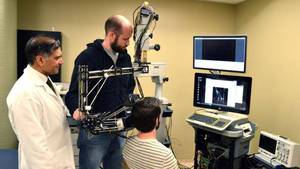Kelly Peckham knew something was terribly wrong when she received a desperate call from her daughter, April, wanting to return home from university in New Brunswick. During April’s visits home to Halifax, she noticed April was not only thinner, but her bubbly personality and excitement for life were gone.
April left university just months before completing her degree and went straight to her family doctor to get help. While she was at home, she finished her degree and graduated with her class, and began her recovery from anorexia nervosa, an illness that had affected her for several years. With a referral to the QEII’s Eating Disorder Clinic, April embarked on an intensive outpatient program.
“Recovery is not easy. Every day is a struggle,” says Kelly, who now facilitates an eating disorders peer support group for parents in Halifax, and has started other groups in Sydney and Wolfville with the help of the Self Help Connection program.
Eating disorders, such as anorexia nervosa and bulimia nervosa, are the third most common chronic illness among adolescents. While about 90 per cent of those diagnosed are female, the disorder is on the rise in males. Most develop eating disorders as a pre-teen or teen, but the QEII clinic is seeing a growing number of women between the ages of 40 and 60.
Characterized by extreme feelings and behaviours about food, eating, and body weight, these disorders have serious physical and psychological effects, even death. “Eating disorders have the highest mortality rate of any psychiatric disorder; 12 to 16 per cent of those diagnosed will die if they don’t receive treatment,” says Dr. David Pilon, a psychologist with the clinic, and a program leader in Specialty Mental Health Services.
For more than 30 years, the QEII’s Eating Disorder Clinic has been helping people, over the age of 18, from across the Maritimes. “This is the most formalized treatment centre east of Montreal,” says Tanya Hamilton, a registered nurse and the clinic’s team leader.
Primarily an outpatient treatment program, the clinic also has three inpatient beds for more intensive medical treatment. “We try to do everything we can to treat people on an outpatient basis and not have them admitted to hospital,” says Dr. Pilon.
At any one time, about 25 people are enrolled in the outpatient program, which offers up to 18 supervised meals and treatment groups per week. Intensity of treatment is tailored to patient needs. “The clinic long ago realized it needed to be flexible to accommodate all patients,” he says.
Once the clinic receives a family physician’s referral, the patient completes a short screening program to determine if they are ready to commit to an intensive treatment program, lasting between six and eight months.
April attended treatment groups every weekday when she was part of the outpatient program nearly seven years ago. The groups helped change her behaviours and attitudes towards food and eating. They also addressed larger issues such as building self-esteem, learning positive problem-solving skills, and setting life goals.
One of the clinic’s focal areas is an open, brightly-lit kitchen where close to a dozen people can gather around a table and eat together, which was supported by generous gifts from QEII Foundation donors. “You can’t recover from an eating disorder without re-establishing a new relationship with food,” says Tanya.
Outpatients are required to have at least one meal per day at the clinic.
“In the kitchen, they are exposed to foods they deemed off limits as a result of their disorder and they learn about normal portion sizes,” says Tanya.
With people in the treatment groups at various stages of recovery, they are able to help support one another. “During recovery from starvation the emotions are awakened, so there may be tears after a meal,” says Tanya. “Treatment is a lot of really hard emotional work.”
Recognizing that recovering from an eating disorder is a long process, patients attend follow-up treatment groups after they have completed the program if needed.
Grateful for the help her daughter received, Kelly celebrates the clinic’s work and rejoices in how far April has come since her darkest days. Now at age 29, April owns a house, has a full-time job with an organization supporting women and children — but most importantly she has her personality back. “She is loving life,” says Kelly.
If you are interested in more information about the QEII’s Eating Disorders Clinic, please contact 902 473 6288. For more information on the eating disorders peer support group for parents, please contact Kelly Peckham at 902 488 5008.








